新概念英语第一册 Lesson 125-126 (共25张PPT)
文档属性
| 名称 | 新概念英语第一册 Lesson 125-126 (共25张PPT) | 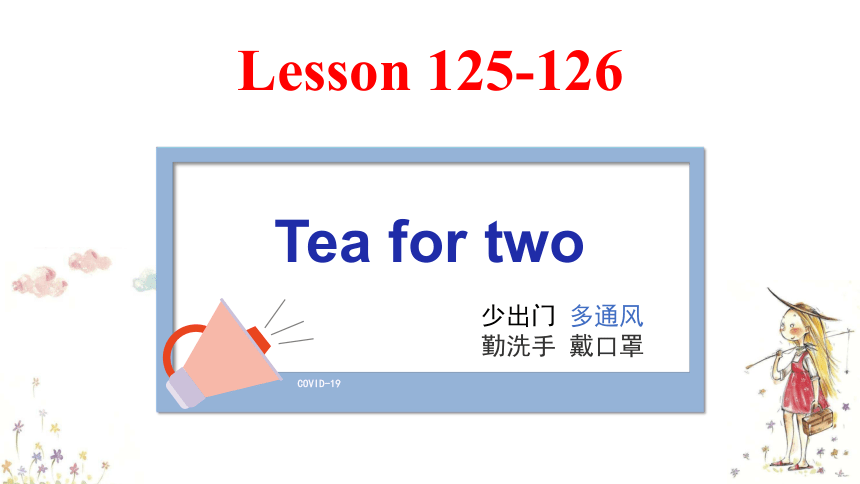 | |
| 格式 | pptx | ||
| 文件大小 | 1.8MB | ||
| 资源类型 | 教案 | ||
| 版本资源 | 新概念英语 | ||
| 科目 | 英语 | ||
| 更新时间 | 2023-12-29 22:11:27 | ||
图片预览


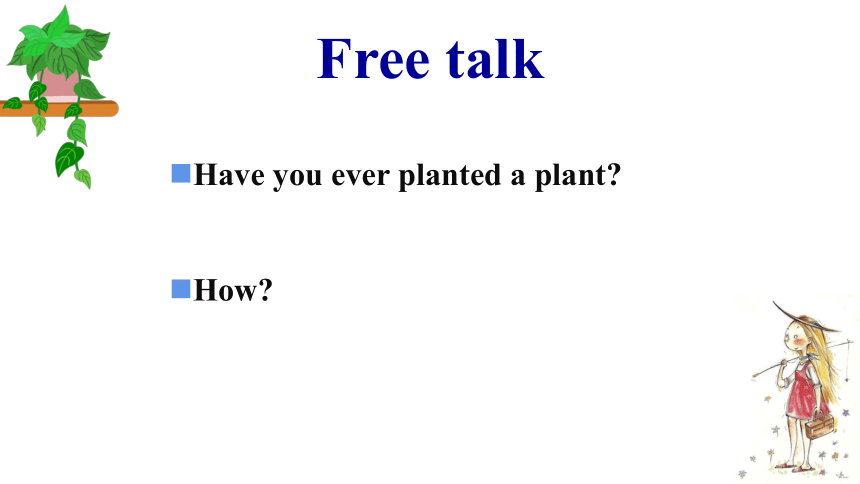
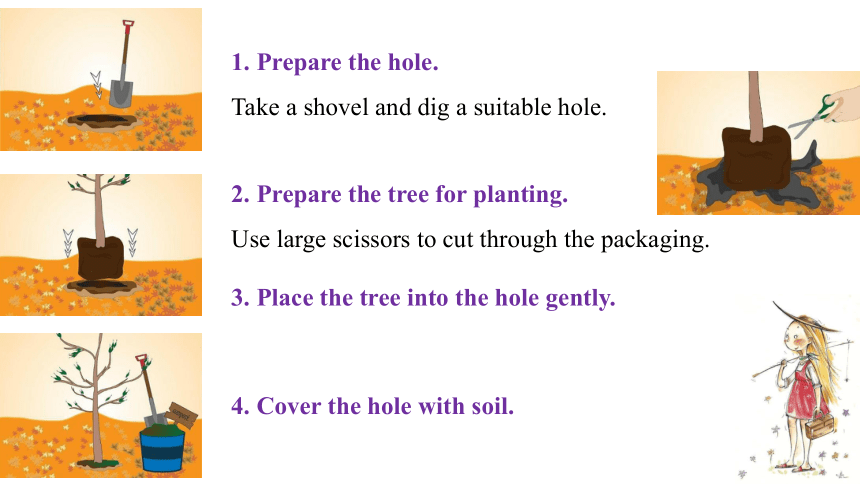
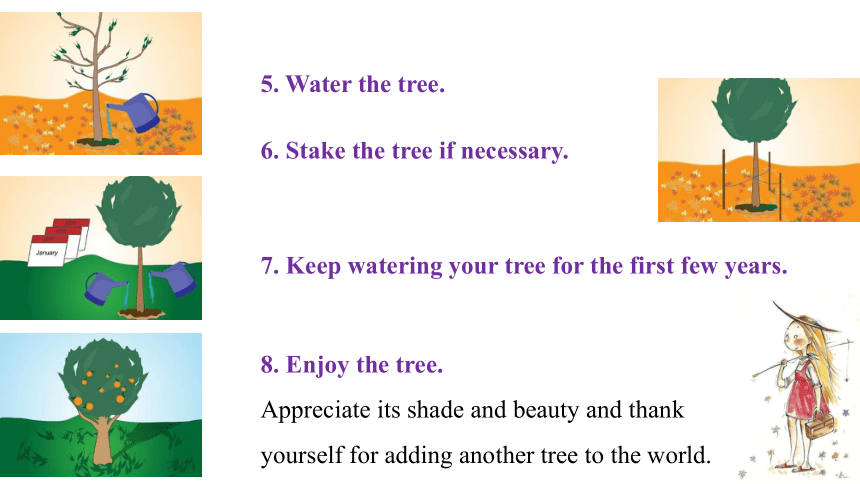
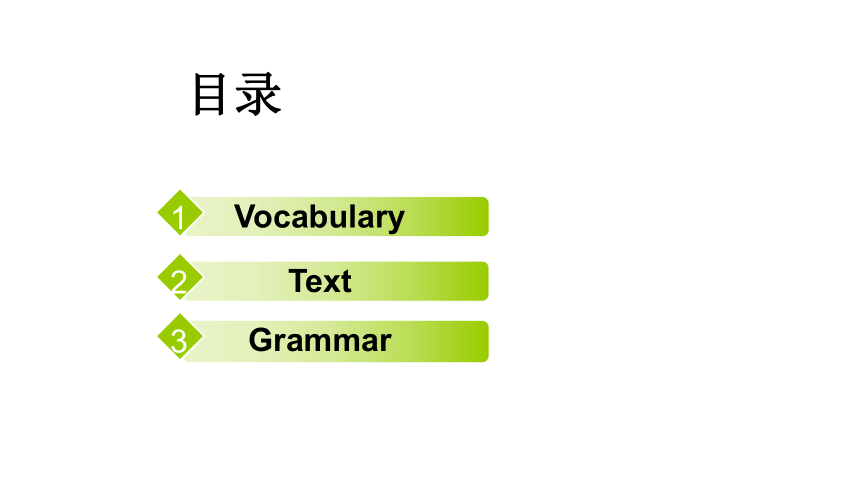
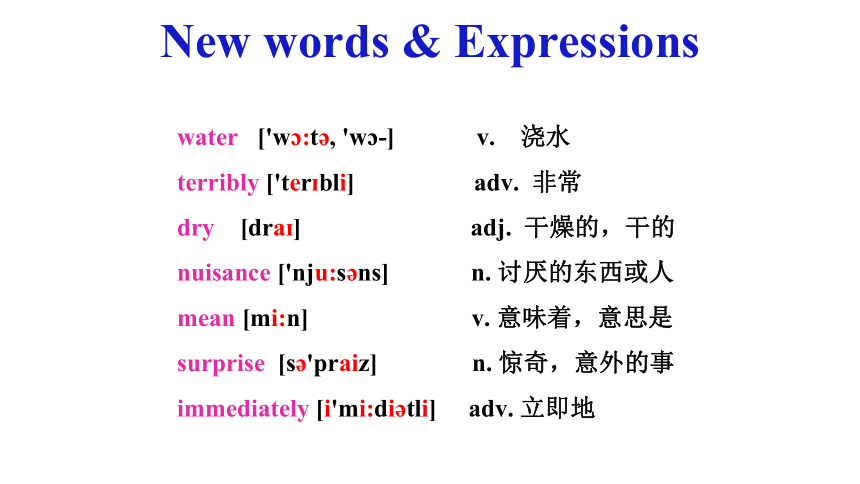
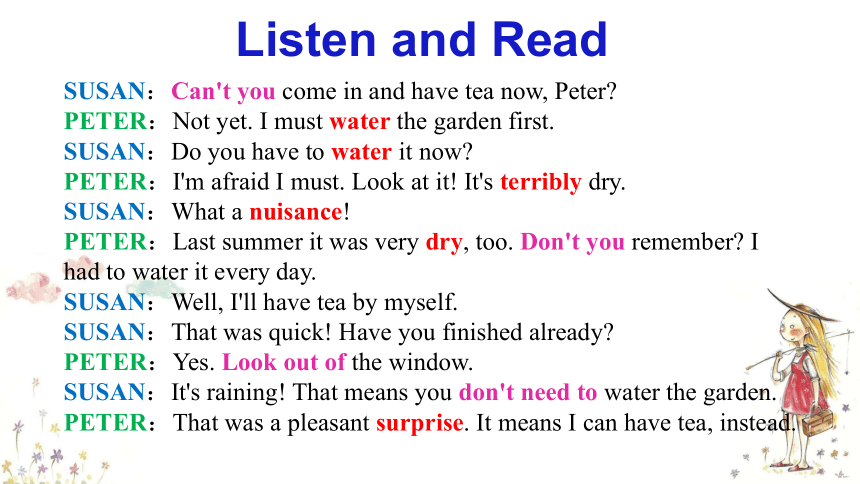
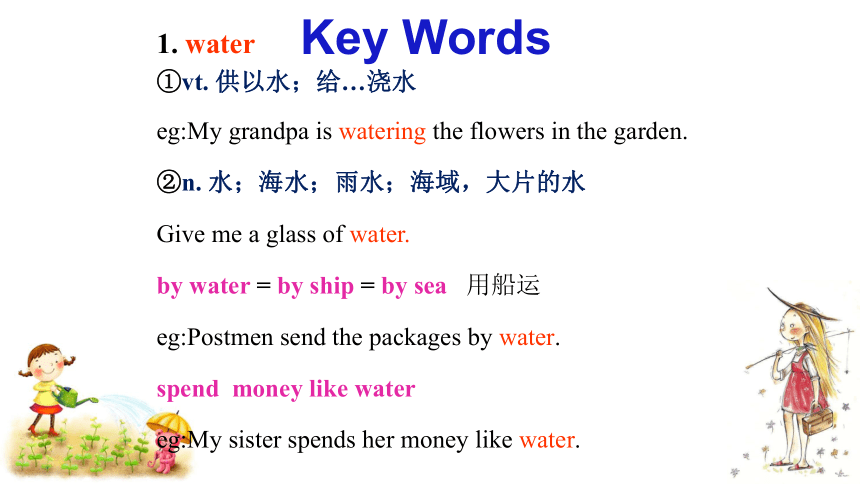
文档简介
(共25张PPT)
Lesson 125-126
COVID-19
少出门 多通风
勤洗手 戴口罩
Tea for two
Let me sleep on it.
请给我一个晚上的时间考虑
Free talk
Have you ever planted a plant
How
1. Prepare the hole.
Take a shovel and dig a suitable hole.
2. Prepare the tree for planting.
Use large scissors to cut through the packaging.
3. Place the tree into the hole gently.
4. Cover the hole with soil.
5. Water the tree.
6. Stake the tree if necessary.
7. Keep watering your tree for the first few years.
8. Enjoy the tree.
Appreciate its shade and beauty and thank yourself for adding another tree to the world.
目录
Grammar
3
Vocabulary
1
Text
2
New words & Expressions
water ['w :t , 'w -] v. 浇水
terribly ['ter bli] adv. 非常
dry [dra ] adj. 干燥的,干的
nuisance ['nju:s ns] n. 讨厌的东西或人
mean [mi:n] v. 意味着,意思是
surprise [s 'praiz] n. 惊奇,意外的事
immediately [i'mi:di tli] adv. 立即地
Listen and Read
SUSAN:Can't you come in and have tea now, Peter
PETER:Not yet. I must water the garden first.
SUSAN:Do you have to water it now
PETER:I'm afraid I must. Look at it! It's terribly dry.
SUSAN:What a nuisance!
PETER:Last summer it was very dry, too. Don't you remember I had to water it every day.
SUSAN:Well, I'll have tea by myself.
SUSAN:That was quick! Have you finished already
PETER:Yes. Look out of the window.
SUSAN:It's raining! That means you don't need to water the garden.
PETER:That was a pleasant surprise. It means I can have tea, instead.
Key Words
1. water
①vt. 供以水;给…浇水
eg:My grandpa is watering the flowers in the garden.
②n. 水;海水;雨水;海域,大片的水
Give me a glass of water.
by water = by ship = by sea 用船运
eg:Postmen send the packages by water.
spend money like water
eg:My sister spends her money like water.
Key Words
2. terribly adv. 非常;
eg:I'm very / really / terribly / extremely sorry.
terrible adj. 糟糕的,极坏的
eg:-How is the weather -It is terrible.
3. dry
⑴adj. 干的(wet 湿的)
⑵ v. 把...弄干
dry one’s eyes 擦干眼泪
⑶ vi. 变干
eg:The summer is hot and dry.
eg:He dried his hair with a towel.
eg:Clothes don’t dry easily in winter.
Key Words
4. nuisance n. 讨厌的东西或人
egWhat a nuisance! 真讨厌!
eg:You are a real nuisance to me. 你真是太讨厌了!
make a nuisance of oneself
= make oneself a nuisance 惹人讨厌
eg:Don't make yourself a nuisance to others.
Key Words
5.mean (meant ; meant)
⑴v. 意思是
eg:The red light means “stop”.
mean to do sth 打算做... eg:I mean to go tomorrow.
mean doing 意味着 eg:The picture means stopping.
⑵adj. 吝啬的 eg:He is mean about money.
⑶adj.卑鄙的
It is mean of sb to do sth 某人做...真卑鄙
It is mean of you to steal the poor’s money.
Key Words
6. surprise
⑴ n. 惊喜;惊讶;意外的事
to sb’s surprise = to the surprise of sb 令某人惊讶的是
eg:To my surprise, she is the mother of two children.
in surprise 吃惊地,在惊慌中
eg:He looked at me in surprise.
⑵ v. 使...惊讶
eg:You always surprise me.
1. Can't you come in and have tea now, Peter
这是否定疑问句,表示邀请。
can’t you …. 表示说话人希望听话人做某事的强烈意愿和看法。
eg:Can’t you come and help me
你就不能来帮帮我吗?
eg:Don't you remember
Language points
Language points
2.I must water the garden first.
情态动词must 表示“必须”,“一定要”,可用于肯定句和疑问句;
用于否定句时,mustn’t 的意思是“一定不要”,“禁止”,而不是“不必”。
eg:You must finish it today.
语法:need 的用法
1. need 用作情态动词时,表示“需要”,后面直
接跟动词原形,且无人称、数的变化,常用于疑问
句和否定句中。
eg:Need I finish my homework now
我需要现在完成作业吗?
Grammar
2. need 作实义动词时,常用于以下几种情况:
A) need sth.
eg:I don’t need your advice.
B) need (sb.) to do sth. 其否定形式要借助助动
词do来完成,即don’t need to
eg:You need to go now.
eg:I need you to help me solve this problem.
Grammar
试一试:请根据括号内提示将下列句子翻译成英文
1. 我们需要买辆新轿车。(此处need 为实义动词)
__________________________
2. 你们不必买这么多东西。(此处need 为情态动词)
__________________________
We need to buy a new car.
You needn’t buy so many things.
Exercise
have to 与do not need to
have to(不得不)有强制性的意味
eg:I have to go to school every week.
need to (有必要)就不太强制去做什么
eg:Tomorrow is Saturday and you don't need to get up so early.
Grammar
Tip:
以must 开头的一般疑问句,如作否定回答,应用_________,不用mustn’t。
eg: — Must I come over tonight
— No, you ________.
needn’t
needn’t
Grammar
have to 与must 均表示“不得不”,但两者有如下区别:
must have to
强调主观需要或有义务,译为“必须做某事”
强调由于客观原因,译为“不得不做”某事”
没有人称、数和时态的变化
疑问形式和否定形式都用must 本身进行变化,否定形式为___________
第三人称单数形式为has to,过去时为had to
疑问和否定形式要借助助动词do,does 或did 来完成,如_____________
mustn’t
don’t have to
请将下列句子变为否定句和一般疑问句,并作否定回答
Lily must go home before nine o’clock.
否定句:________________________________
一般疑问句:_____________________________
否定回答:_________________
Lily mustn’t go home before nine o’clock.
Must Lily go home before nine o’clock
No, she needn’t.
Exercise
1.Must I take care of my grandma
Yes, you ____./No, you ______.
2.Does she have to come home before 7
Yes, she _____./No, she __________.
Exercise
must
needn't
has to
doesn't have to;needn't
COVID-19
少出门 多通风
勤洗手 戴口罩
1. To finish the exercises after the text.
2. To practise the structures learned during the class.
Homework
Thank you!
See you next time!
Lesson 125-126
COVID-19
少出门 多通风
勤洗手 戴口罩
Tea for two
Let me sleep on it.
请给我一个晚上的时间考虑
Free talk
Have you ever planted a plant
How
1. Prepare the hole.
Take a shovel and dig a suitable hole.
2. Prepare the tree for planting.
Use large scissors to cut through the packaging.
3. Place the tree into the hole gently.
4. Cover the hole with soil.
5. Water the tree.
6. Stake the tree if necessary.
7. Keep watering your tree for the first few years.
8. Enjoy the tree.
Appreciate its shade and beauty and thank yourself for adding another tree to the world.
目录
Grammar
3
Vocabulary
1
Text
2
New words & Expressions
water ['w :t , 'w -] v. 浇水
terribly ['ter bli] adv. 非常
dry [dra ] adj. 干燥的,干的
nuisance ['nju:s ns] n. 讨厌的东西或人
mean [mi:n] v. 意味着,意思是
surprise [s 'praiz] n. 惊奇,意外的事
immediately [i'mi:di tli] adv. 立即地
Listen and Read
SUSAN:Can't you come in and have tea now, Peter
PETER:Not yet. I must water the garden first.
SUSAN:Do you have to water it now
PETER:I'm afraid I must. Look at it! It's terribly dry.
SUSAN:What a nuisance!
PETER:Last summer it was very dry, too. Don't you remember I had to water it every day.
SUSAN:Well, I'll have tea by myself.
SUSAN:That was quick! Have you finished already
PETER:Yes. Look out of the window.
SUSAN:It's raining! That means you don't need to water the garden.
PETER:That was a pleasant surprise. It means I can have tea, instead.
Key Words
1. water
①vt. 供以水;给…浇水
eg:My grandpa is watering the flowers in the garden.
②n. 水;海水;雨水;海域,大片的水
Give me a glass of water.
by water = by ship = by sea 用船运
eg:Postmen send the packages by water.
spend money like water
eg:My sister spends her money like water.
Key Words
2. terribly adv. 非常;
eg:I'm very / really / terribly / extremely sorry.
terrible adj. 糟糕的,极坏的
eg:-How is the weather -It is terrible.
3. dry
⑴adj. 干的(wet 湿的)
⑵ v. 把...弄干
dry one’s eyes 擦干眼泪
⑶ vi. 变干
eg:The summer is hot and dry.
eg:He dried his hair with a towel.
eg:Clothes don’t dry easily in winter.
Key Words
4. nuisance n. 讨厌的东西或人
egWhat a nuisance! 真讨厌!
eg:You are a real nuisance to me. 你真是太讨厌了!
make a nuisance of oneself
= make oneself a nuisance 惹人讨厌
eg:Don't make yourself a nuisance to others.
Key Words
5.mean (meant ; meant)
⑴v. 意思是
eg:The red light means “stop”.
mean to do sth 打算做... eg:I mean to go tomorrow.
mean doing 意味着 eg:The picture means stopping.
⑵adj. 吝啬的 eg:He is mean about money.
⑶adj.卑鄙的
It is mean of sb to do sth 某人做...真卑鄙
It is mean of you to steal the poor’s money.
Key Words
6. surprise
⑴ n. 惊喜;惊讶;意外的事
to sb’s surprise = to the surprise of sb 令某人惊讶的是
eg:To my surprise, she is the mother of two children.
in surprise 吃惊地,在惊慌中
eg:He looked at me in surprise.
⑵ v. 使...惊讶
eg:You always surprise me.
1. Can't you come in and have tea now, Peter
这是否定疑问句,表示邀请。
can’t you …. 表示说话人希望听话人做某事的强烈意愿和看法。
eg:Can’t you come and help me
你就不能来帮帮我吗?
eg:Don't you remember
Language points
Language points
2.I must water the garden first.
情态动词must 表示“必须”,“一定要”,可用于肯定句和疑问句;
用于否定句时,mustn’t 的意思是“一定不要”,“禁止”,而不是“不必”。
eg:You must finish it today.
语法:need 的用法
1. need 用作情态动词时,表示“需要”,后面直
接跟动词原形,且无人称、数的变化,常用于疑问
句和否定句中。
eg:Need I finish my homework now
我需要现在完成作业吗?
Grammar
2. need 作实义动词时,常用于以下几种情况:
A) need sth.
eg:I don’t need your advice.
B) need (sb.) to do sth. 其否定形式要借助助动
词do来完成,即don’t need to
eg:You need to go now.
eg:I need you to help me solve this problem.
Grammar
试一试:请根据括号内提示将下列句子翻译成英文
1. 我们需要买辆新轿车。(此处need 为实义动词)
__________________________
2. 你们不必买这么多东西。(此处need 为情态动词)
__________________________
We need to buy a new car.
You needn’t buy so many things.
Exercise
have to 与do not need to
have to(不得不)有强制性的意味
eg:I have to go to school every week.
need to (有必要)就不太强制去做什么
eg:Tomorrow is Saturday and you don't need to get up so early.
Grammar
Tip:
以must 开头的一般疑问句,如作否定回答,应用_________,不用mustn’t。
eg: — Must I come over tonight
— No, you ________.
needn’t
needn’t
Grammar
have to 与must 均表示“不得不”,但两者有如下区别:
must have to
强调主观需要或有义务,译为“必须做某事”
强调由于客观原因,译为“不得不做”某事”
没有人称、数和时态的变化
疑问形式和否定形式都用must 本身进行变化,否定形式为___________
第三人称单数形式为has to,过去时为had to
疑问和否定形式要借助助动词do,does 或did 来完成,如_____________
mustn’t
don’t have to
请将下列句子变为否定句和一般疑问句,并作否定回答
Lily must go home before nine o’clock.
否定句:________________________________
一般疑问句:_____________________________
否定回答:_________________
Lily mustn’t go home before nine o’clock.
Must Lily go home before nine o’clock
No, she needn’t.
Exercise
1.Must I take care of my grandma
Yes, you ____./No, you ______.
2.Does she have to come home before 7
Yes, she _____./No, she __________.
Exercise
must
needn't
has to
doesn't have to;needn't
COVID-19
少出门 多通风
勤洗手 戴口罩
1. To finish the exercises after the text.
2. To practise the structures learned during the class.
Homework
Thank you!
See you next time!
同课章节目录
